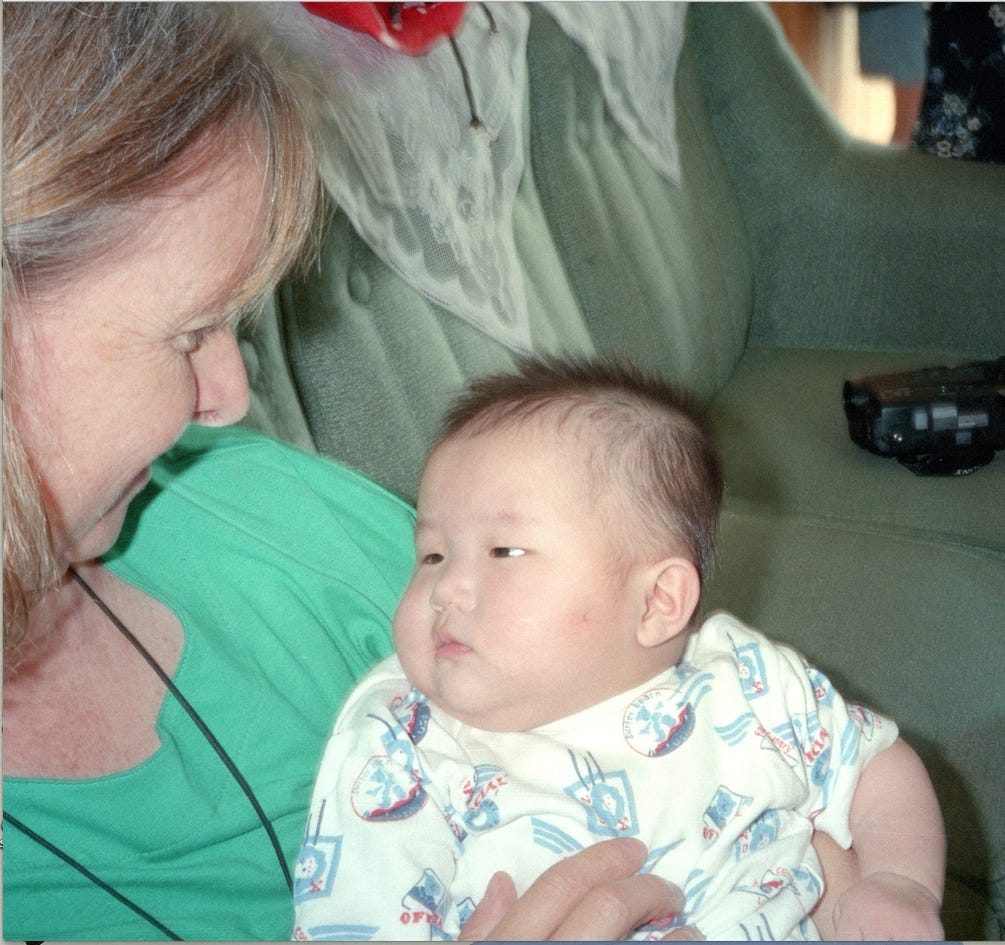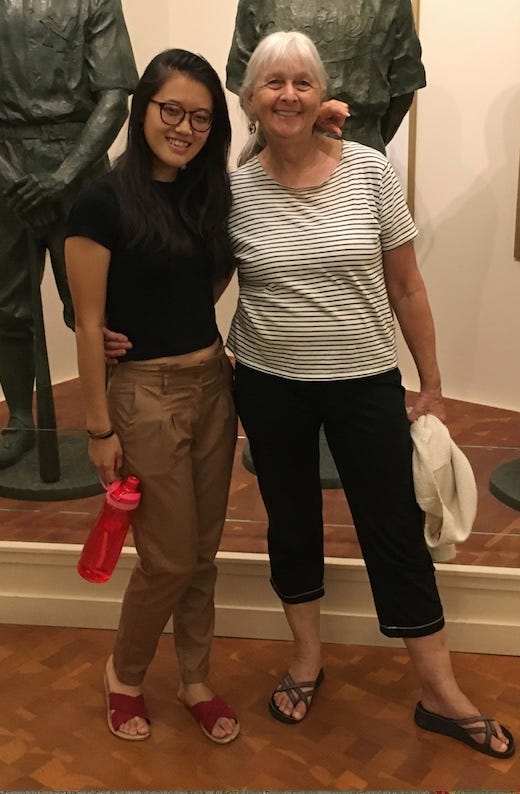On the June morning in 1997 when I first held Chang YuLu, which is the name the orphanage staff gave my daughter, I could not imagine that one day Maya, the name I gave her, would be able to go online, order a DNA kit, spit into a tube, send her saliva for analysis, and learn if her genes are a match with a Chinese family who’d surrendered a child during that country's One-Child Policy era. Birth families in China are submitting DNA to data banks hoping to one day fine the child they once abandoned. Or with DNA it's possible my daughter might connect with a birth sibling who was also adopted. Those are choices she now can make.

On the morning I first met and held my daughter, Chang YuLu, who soon would become Maya Xia Ludtke
Turning the pages of Random Families provoked me to think deeply about similar experiences I've had with adoptive parenting. For instance, those of us who adopted children from China returned home to create large, extensive social networks in which we asked each other questions, shared learning from our experiences, and gathered with our children to celebrate cultural occasions. For many years, my China travel group of eight families came together for reunions at swimming pools, beaches and Chinese restaurants. I know parents in other travel groups do this too, at least until their children reach the mid-to-late teens. Then, they take over, figuring out visits, forming friendships (or not), and connecting online.
Conversations in Random Families among parents and children bear a striking similarity to ones I've had and heard in many of the adoptive networks to which I belong. There are, of course, differences given the shared DNA among the diblings. But as our children have aged — my daughter is 22 years old — they also find online gathering spots, such as with China Children International, a digital meeting space — and sometimes an in-person social network, too — created by young adult adoptees. Such digital and social places are where the adoptees meet to enjoy the company of those who are on the same adoptive journey and share information about topics such as birth family searches, DNA test results, and identity.
What struck me is the similarity between birth family searches in China and the relationship that a child has or doesn't have with her sperm donor. In the decades since I stepped away from using donor sperm, the customs, laws, and choices related to this industry have changed dramatically, mostly offering greater transparency about the donor. A man who is donating sperm can now agree to give permission for his identity to be made known to every child who is conceived with his sperm when he/she turns 18 years old. Or he can choose to remain anonymous. (In Australia, there are locations where lawmakers require all donors to agree to have their identity be known, but in the US the clinics still set their own policies.) No matter the decision the donor makes, as these authors note, he is "never a father figure."

Maya and Melissa at the Baseball Hall of Fame in Cooperstown, New York, July 2017
Among both these parents and children the authors found the desire "to reserve the language of family for their own nuclear ones." As one preschool child responded to classmates asking him why he had no father by saying, "I don’t have a daddy. I have a donor." Knowing this question might arise, this child's family prepared their son well, just as I know families in the Chinese adoptive community do, too, as we prepare our children for the inevitable time when a stranger feels she can ask any question that comes to mind — in front of our children! It should surprise no one to learn how unthinking some of these questions can be, as I suspect these intrusions feel to the siblings, as well.
In being a single mom who has traversed the territory of queries that begin with “what about her father?,” I was happy when Hertz and Nelson integrated in-depth personal stories about two sperm donors into their book. Each man brought a different approach to the question of what happens when children reach the age of 18 and reach out to him. One man fully embraced the idea of getting to know and be known to these young adults whose DNA he shares; the other one set firm, limited boundaries, letting them know he did not want to form any closer relationship than being known to them and answering a few of their questions.
Whether the topic is networks or reunions, DNA or language of family, the two generations of voices I heard in Random Families resonated with me. I sense this will be the case with readers who come to this book without having the same personal connections I do with either donor sperm or adoption. Families like the ones Random Families portrays are rooted in our American landscape. Thankfully, the regrettable era of family secrecy about this form of conception has largely passed, prompted by single women, who in choosing this method for becoming pregnant then made sure their children knew how they’d been conceived. Their push for greater openness made it happen.
It’s likely that all of us, and especially our children, have met or will come in contact with people who have been conceived by donor sperm. Perhaps we won’t know this upon meeting them since for each of us our origin story remains one that we get to tell to those we want to know it. Discovering how these children came to be and where their journey is taking them will help each of us to bridge whatever gaps in understanding about these families that we might possess.
Melissa Ludtke, a veteran journalist, wrote the 1997 book, “On Our Own: Unmarried Motherhood in America,” and is writing a memoir about her 1977 lawsuit, Ludtke v. Kuhn, against Major League Baseball in which she gained equal access to locker rooms for women reporters.
Pages: 1 · 2
More Articles
- Gender and Labor Markets by Diego Mendez-Carbajo* : "Sure [Fred Astaire] was great, but don't forget that Ginger Rogers did everything he did…backwards and in high heels." — Robert Thaves1
- Veterans Health Care: Efforts to Hire Licensed Professional Mental Health Counselors and Marriage and Family Therapists
- Adrienne G. Cannon Writes: Those Lonely Days
- Jill Norgren Reviews a New Inspector Gamache Mystery: All the Devils Are Here
- Rose Madeline Mula Writes: Look Who's Talking
- Celebrating 100 Years of Women Voting; Virtual Sessions: United States Capitol Historical Society
- Supreme Court Surprises The Public in LGBTQ Ruling: What is Sex Discrimination?
- Speaker of the House Nancy Pelosi And Donald Trump Last Year
- Elaine Soloway's Hometown Rookie: Mirror, Mirror; Jealous; Terms of Endearment
- Margaret Cullison: Cooking with Grandchildren Including Inauguration Cookies, Orange Julius and Chocolate Birthday Cake






